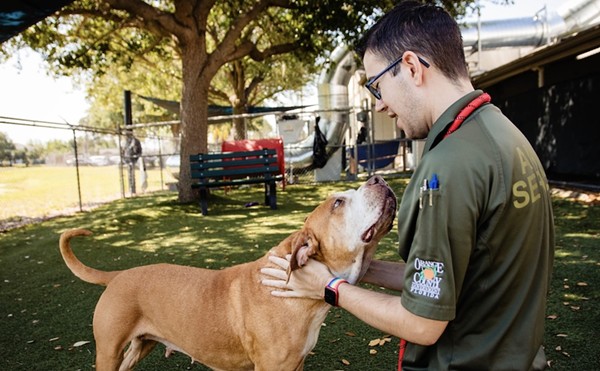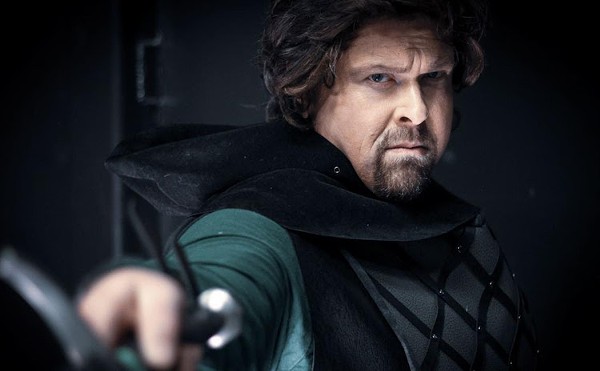Edward DeAguilera's résumé doesn't exactly scream "cutting-edge theater." At various times in his professional career, the 29-year-old DeAguilera has: managed political campaigns for Republican state representatives Bob Starks and Randy Johnson; helped market a health-products line developed by Roy Speer, creator of the Home Shopping Network; handled community affairs for the SPCA of Central Florida; acted as voter service coordinator for Orange County Supervisor of Elections Bill Cowles; and directed the centennial celebration for the City of Winter Garden. Faced with such a far-reaching display, one can only wonder what a nice overachiever who leads with his right wing is doing running the Orlando International Fringe Festival.
"I'm a native, so I'm familiar with the Fringe," says DeAguilera, a gregarious Windermere resident who was tapped last December to be the executive director of the 12-year-old performing-arts festival. "And I'm a firm believer that, for Orlando to go to the next level, we need an extremely strong arts and cultural community. I think the Fringe is leading the way with that.
"Also," he understates, "I'm not the type of a person that can just sit in front of a desk and do the same thing over and over and over again."
A vivacious glad-hander on approach, DeAguilera appears to know a thing or two about getting an employer noticed. The most salient example appears to be his work on the Winter Garden celebration, which ran for a year but entailed some two and a half years' worth of effort. According to Winter Garden's recreation director, Larry Caskey, who was able to observe DeAguilera's performance throughout the process, his duties ran the gamut from setting up and fine-tuning monthly recreational events to recruiting volunteers and raising funds. The highlight was a climactic, daylong anniversary celebration that Caskey says drew between 25,000 and 30,000 attendees. (Last year's Fringe, in comparison, circulated 7,000 admission buttons, the surest arbiter of turnout.)
"It was a very, very difficult job," Caskey says. "We were afraid someone was going to get in there and not stay the whole year. [But] everything was just really nice. For the most part, he was just very laid-back and easygoing, and that's probably what got him through. He didn't panic a lot." DeAguilera, Caskey says, was also instrumental in carrying awareness of the centennial beyond the city limits.
Those are all words to cherish for the Fringe, a 10-day, nonjuried showcase of left-of-center theatrical arts that has a history of underacknowledgment. In all its time as a local fixture, the festival has never managed to secure its hoped-for level of support from the public or Orlando's commercial infrastructure, and it's this failing DeAguilera has been conscripted to remedy. From securing corporate sponsorships to building relationships with groups like the Orlando/ Orange County Convention and Visitors' Bureau, he will essentially be the Fringe's point man in the business community -- a walking, talking talisman of the festival as a good investment. The Winter Garden experience is the most overt indicator that he can do it, but those involved in his hiring admit that personal style played a role, too. Cid Stoll, an experienced theatrical producer who took over as president of the Fringe's board last year, says that, among his other qualifications -- good ideas and a stuffed Rolodex among them -- DeAguilera "dressed the part." That's not as trivial as it sounds, given the tendency of corporate types and arts boosters to regard each other as creatures from different planets. (OW thumbnail portrait: DeAguilera is the kind of guy you always picture wearing a turtleneck, whether he is or not.)
The Fringe leadership reportedly heard from more than 200 executive-director candidates before awarding DeAguilera the position last December. A designated search committee whittled the field of applicants down to four top candidates, who were subjected to intensive personal interviews. Like the other three finalists, DeAguilera even participated in a role-playing session, in which he had to respond to improvised crises of the sort his new job might reasonably entail. Yet despite his success at the parlor-game aspect of the process, he claims no aspirations to the performance spotlight, and that, too, helped net him the position. It's clear that the Fringe is seeking to define "show running" in terms far removed from the phrase's airier, amateur-theater connotations: Though the festival's executive producer, Christopher Lee Gibson, and its recently hired associate producer, Beth Marshall, are actors by trade, both have clauses in their contracts forbidding them from appearing in Fringe plays without the prior consent of the board's executive committee.
A strong administrative hand will be needed at Fringe 2004 (May 20 through 30), which will likely be the most complicated undertaking in the event's history. As previously reported, the festival will be split between its traditional downtown berth and the more theatrically endowed Loch Haven Park. While the change is already reaping dividends -- participating groups can now know the details of their performance spaces months in advance -- it's still going to be a logistical hurdle for the festival's production team and audiences. (Some early talk about setting up shuttle-bus routes seems to be yielding few results, with Gibson and other festival veterans instead stressing the need for Fringers to alternate their show-going between "downtown days" and "Loch Haven days.")
DeAguilera's arrival demonstrates that the Fringe has responded to its ongoing challenges by laying out a more sophisticated (and, it's hoped, more effective) division of labor. Gibson, who had risen to the post of executive director over the last three years, suggested his own "demotion" to executive producer, a part-time position that only becomes full-time in the six weeks before, during and after the festival. By his own admission, Gibson is not a businessman, and he's more than happy to concentrate on serving the needs of the local and international performing groups that the Fringe hosts while DeAguilera interfaces with corporate and community bigwigs.
Such schmoozing will be of critical importance. Arts initiatives remain underfunded throughout the nation; just last week, the 13-year-old Seattle Fringe Festival went belly-up. And for the Orlando International Fringe Festival, the only upside of the recent announcement that Orange County's Arts & Cultural Affairs department will be disbursing tourist-tax monies to a wider pool of arts groups is the realization that the festival always netted far less than its fellow recipients (the Orlando Museum of Art, the Florida Film Festival and the Zora Neale Hurston Festival) anyway. Though Gibson says that the Fringe is solvent enough that it no longer has to live year-to-year (instead concentrating on five-year growth plans), greater operational consistency is still a sought-after quantity.
The need for the Fringe to form new strategic alliances may be one reason why DeAguilera's $35,000-per-year salary is said to be augmented by a "phenomenal" potential for performance-based bonuses. Everyone involved appears to hope that he'll have longevity in the position; arguably, it would be another sign of stability that could endear the Fringe to wary partners. Although he's about a year and a half away from earning his master's in political science from Orlando's Columbia College, DeAguilera maintains that he's pursuing the degree "just as a personal thing" -- to enhance his competitiveness in the market by getting "a couple of letters after [his] name." But he claims no intention to vacate the festival's Amelia Street offices when those letters are finally in place. (Reassuring news indeed to those of us who detect no shortage of young GOP wonks in the current labor pool.)
While DeAguilera strives to convey the impression that he's in for the long haul, speculation persists that Gibson will be stepping down entirely after this year's edition. It's no secret that he was discouraged by the procedural nightmares of Fringe 2003 -- in which unaffiliated, poorly scheduled street concerts wreaked havoc on play performances -- nor that acting remains his real passion. As a further signpost, there's the appointment of Marshall as associate producer, traditionally a stepping-stone position. Yet when he's asked what he'd like to be telling himself on May 31, the day after Fringe 2004 wraps, Gibson answers, "Ã?I want to do this again next year.' Because that is not the way I felt after [last] year's festival."
Marshall hopes to discover that she loves her new job as much as performing or directing theater. DeAguilera, though, confronts the realities of his new status with a can-do statement of responsibility: "I do not want to be a part of letting down the arts community in Orlando," he says with determination.
Read his lips: No new disappointments.
("Fabulous Fringe," a fund-raiser for the Orlando International Fringe Festival, will be held 6 p.m. Monday, March 1, at the Peacock Room. For details, call 407-648-0077, or visit www.orlandofringe.com)















